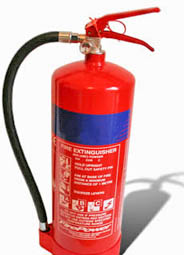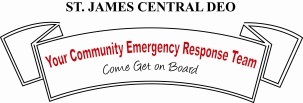ARE YOU PREPARED?
The period of time that your company takes to get back to business after an incident depends on how you address your emergency planning today.
 The Department of Emergency Management St. James Central District Emergency Organisation has over the last five years continued to bring to the attention of our community the issues and hazards which can have severe consequences, should we be impacted, and therefore the importance to establishing best practices in emergency management preparedness and mitigation, response and recovery. The Holetown, Sunset Crest area in particular has had its share of flooding and other emergencies associated with flooding.
The Department of Emergency Management St. James Central District Emergency Organisation has over the last five years continued to bring to the attention of our community the issues and hazards which can have severe consequences, should we be impacted, and therefore the importance to establishing best practices in emergency management preparedness and mitigation, response and recovery. The Holetown, Sunset Crest area in particular has had its share of flooding and other emergencies associated with flooding.
In 2007 a joint private/ business sector governmental initiative has resulted in 60% of water being contained upstream, therefore adding some relief to the coastal plains. This initiative is a significant paradigm shift in the common belief that government must be the only benefactor to solve problems in our community.
I take this opportunity to commend that project and look forward to other similar solutions that can significantly assist the process of mitigation and preparedness management.
The frequency and intensity of disaster and potential disasters have doubled over the last ten to fifteen years, therefore with the expectation and possible consequences of climate change, we can expect this trend to accelerate. Our preparedness therefore must become more critical. Each business and hotel by its location and potential to hazards will be unique, therefore all residents of Holetown, 1st and 2nd Streets in particular need to put emergency procedures in place, and be more consistent to practice wholesome processes that can reduce the quantum to damage and dislocation, therefore financial and production fall out that can occur are kept to a minimum.
The west coast is very crucial to the economic sustainability of our island, comprising of a wide variety of service industry partners, large properties, hotels, and governmental agencies, all significantly providing employment to a considerable number of persons. It is suitably charged to establish a commitment to collectively engage a representative body to ensure that business investment has a greater chance of survival from the hazards and man made disasters that may present them selves.
If businesses are to recover speedily and successfully our nation, economy and our people must be secure. The west coast contributes significantly to the GDP of the country. A commitment to planning today and to be actively pursuing best practices will protect investment, support employment and customers.
 Every business regardless of how small should have a plan. If you have not established one, get ready now. Plan to stay in business by building resilience to disaster.
Every business regardless of how small should have a plan. If you have not established one, get ready now. Plan to stay in business by building resilience to disaster.
If you need assistance, seek qualified personnel in this field, to assist you. We will be glad to assist you, but do not continue to put it off.
If you are starting from scratch, do a risk assessment. Don’t be distracted with the term, all it seeks to do is to determine the size and scope and functioning of your business, and seeks to determine what your risks are in relation to the hazards which can impact on your location. You will therefore need to know your community risk whether natural or man made.
Continuity Planning assesses how your company functions. It seeks to determine the status of your equipment, materials, operational procedures and clients necessary to keep your business afloat. You constantly review your critical operating components and establish procedural plans for succession on managing the business during and after impact.
Response and recovery plans will be facilitated easier if you have prior to impact, established an emergency plan, which includes all workers in the planning, preparedness and mitigation structures. These plans will also address how you can service your customers, suppliers and resources during and after impact. It will lead you to constantly review, update and practice aspects of these plans.
An emergency plan will encompass:-
- Planning for your employees-. They are the most important asset to the survival of your business.
- Communication sharing, training and defining clear responsibilities and engagement are also important
- Consider setting up a call tree or other procedures to communicate with employees in an emergency, and set up a specific telephone number to which employees when not of work can call and report their status and availability
- If you have employees with disabilities, talk with them. Ask them what assistance they require, don’t assume anything. They will know their needs better than you.
Seek to find out what communication difficulties they may have. Find out what their physical limitations are, and what their medical and medication requirements are. Be sure to assign a suitable person to assist them.
Find out what mode of transportation is required. Seek to ensure both visual and audible alarms and instructions are practiced. Don’t plan for the disabled. Let them be part of the planning process.
Make fire prevention and safety an integral part of your plan.
When last have your business been inspected and your fire prevention and safety procedures tested. Have you installed smoke and fire alarms and detectors, fire extinguishers, fire hoses and other fire preventative equipment suitable for the type and size of your business? What procedures or processes do you have in place for alerting others and the fire department? Do persons know how to operate the fire extinguishers and how to test the alarm systems? When last have you had a fire drill?
Do you know where your fire exits are and where your evacuation routes are?
Do you have an evacuation plan?
The ability to evacuate workers, guests and customers effectively and quickly can save lives. It is required to know who is in your building. If fire officials or emergency personnel tell you to evacuate, do so immediately. Identify clearly a chain of command whose responsibility it is to instruct staff to evacuate, who will be required to shut down critical operations.
Having clearly marked entry and exits routes, and identifying a minimum of two safe evacuation routes, will enhance your procedures. An adequate warning system inclusive of both visual and audible features will assist those disabled persons.
Designate where your assembly or staging sites will be and also an alternative, and make sure that all persons are safely accounted for at the assembly site. Your cooperation and support with the local emergency agency responsible for controlling the hazard or incident will indicate if and when it is safe to return to the building. If you are in a high rise building, or multi-tenanted building, it is very important to coordinate and practice your procedure with all persons, so as to avoid confusion, gridlock or even casualties.
Are you prepared for medical emergencies?
Medical emergencies will vary depending on the causes of disaster, the type of building and the number of persons involved. You can increase the chances to respond to some medical emergencies by encouraging staff to become certified in First Aid and CPR. You should have a fully stocked First Aid kit easily accessible. Have a plan to be accommodated at the nearest medical facility. Always have a designated emergency bay, with free access for emergency vehicles and personnel. Always practice best health and safety procedures; this will reduce the occurrence and causes of medical emergencies.
Encourage all staff to have a family and individual preparedness plan. If individuals and their families are prepared, your business and other co workers are better positioned to deal with emergencies when they occur. Therefore give incentives to achieve this as part of your business plan.
Are you prepared for utility disruption?
Your utility providers in Barbados tries to maintain reliable services, but disruption occurs from time to time. Pay attention to know where your utility enters your building and always have stop valves and tools to turn off or on the service, and have these valves properly labeled.
Speak to a qualified utility technician and explore what back up options are available, so that you minimise disruption to service. Pay special attention to those services which are critical to your day to day operations.
Do you have adequate insurance coverage?
- Failure to have adequate coverage will lead to major financial losses, should your business be damaged, destroyed or disrupted for a period of time. You should pay attention to ensure what you are covered for.
- Does you plan cover payment to staff and creditors?
- Will you as manager have an income?
- Will the insurance cover your restoration or repairs process?
- Persons who sustained injury while on your property, were they covered?
- Always ensure that you photograph and keep good records before and after impact, and have those safely stored for presentation when requested by your insurance agent.
Great! You have a plan. When last did you practice or review your plan?
You should schedule regular educational and training seminars and drills, so as to develop and fill the gaps that appear in your plan from time to time. Whenever you have additional staff, they must do company orientation processes to emergency planning, just as they will do for their respective job assignments. If you are part of a multi tenanted building, all tenants should practice and share common emergency procedures, applicable to its location and hazard.
How equipped and secure is your business to disaster?
 Have you installed the required type of fire extinguishers, smoke detectors and fire alarm systems and other fire prevention devices? If you have stored water on site, can persons contaminate your storage? Is your electrical supply, switches and panels adequately labeled and secured from possible flooding?
Have you installed the required type of fire extinguishers, smoke detectors and fire alarm systems and other fire prevention devices? If you have stored water on site, can persons contaminate your storage? Is your electrical supply, switches and panels adequately labeled and secured from possible flooding?
What are your bomb threat or hazardous incident procedures? Is your emergency supply properly maintained and regularly tested on load. Who comes and goes into your building? Do you have a system to monitor, control and record entry and exit points.
What procedures and control devices have you adopted to protect your information data base and record keeping?
Do you have stored spares or easy access to same in the event of an emergency? Protecting your data and information technology systems may require special expertise, depending on the size and scope of the business.
Do you have sick building syndrome?
This term was recently cloned to represent buildings with poor quality air within and outside. Upgrading and routine maintenance schedules can significantly reduce polluted air and other respiratory hazards which can reduce staff productivity and moral.
In summary all it leaves for me to say, a comprehensive emergency plan helps to protect your investment and it gives support to staff, customers, suppliers and the wider community in which your business operates.
Do not delay if you do not have a plan. If you already have a plan, make sure you revise and update your plan annually. Your business stands a better chance of survival in this world today, challenged by natural or man made disasters.
What about the future and the unknown consequences of climate change? Get ready now. Be proactive.
